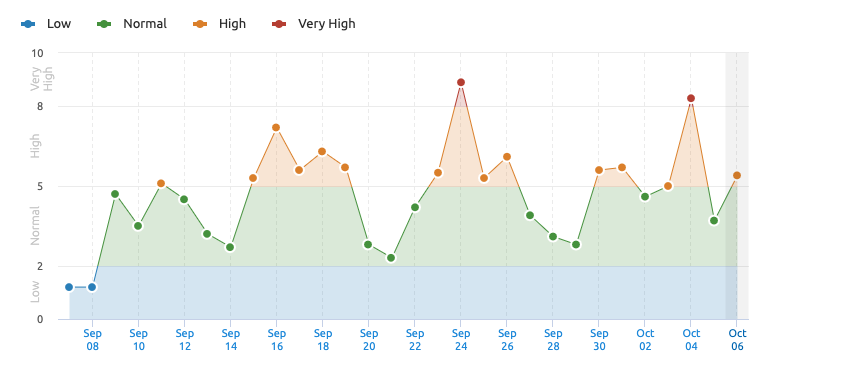September saw some noticeable canonical and indexing issues that affected Google’s search results. Although some in the SEO community originally thought that these spikes in the SERPs were the result of an as-yet-unannounced Google update, it was later revealed to be two different bugs that were causing all the commotion.
As confirmed by Google, one of the issues affected mobile indexing, while the other affected canonicalisation, which in turn affected how content was being shown in search results. For clarification, canonicalisation refers to search engines being notified of which version of a URL is the ‘original’. If a site owner decides to syndicate content – meaning they allow their content to be republished on another site – then canonical tags are used to show search engines whether a URL is the original content page, or a ‘duplicate’. This helps the site that originally provided the content to still rank in the SERPs when its content is reproduced elsewhere.
So, if your site’s organic traffic was affected on 21st September, it was likely due to the indexing issues.
On 1st October, Google Search Liaison reported they were “working to resolve two separate indexing issues that have impacted some URLs.”
They have been elaborating further via their Twitter thread:
If a previously indexed page has gone, it might be the mobile-indexing issue, where we’re failing to select any page at all to index. If the canonical issue is involved, URL Inspector may show the URL as a duplicate & the Google-selected canonical will be different from it….
— Google SearchLiaison (@searchliaison) October 1, 2020
What Happened
On 23rd September, there was talk in the SEO community of another Google search ranking algorithm update, with automated tracking tools showing spikes. Users reported seeing unrelated results for their queries, and there were reports of previously indexed web pages no longer appearing in search results.
The fluctuating SERPs can be seen in this screenshot of the SERP volatility checker below:

SEO veteran Glenn Gabe commented on 26th September: “I had a news publisher reach out to me that has seen 1,300 articles get canonicalised TO COMPLETELY DIFFERENT ARTICLES.”
Fibre previously tweeted about the issues on 30th September (see here). That same morning, SEO Roundtable’s Barry Schwartz reported seeing several complaints on Twitter about pages being dropped from Google’s search index.
One user commented on the article, “Today I found out that the main page has disappeared from the index. The page has been in the top for more than 4 years, no prohibited methods were used, there were no alerts, no changes were made to the site either. Yesterday I filled out the questionnaire “Share your experience with Search Console Insights” and today the page is not in the index, and accordingly the drawdown of positions and traffic. Where to dig, what happened.”
However, Google Search Liaison said the canonicalisation problems actually started as early as 20th September, and that the mobile-indexing issues began even earlier (although these bugs really became more noticeable on 21st September);
The issue with canonicals impacted roughly about 0.02% of our index, beginning around Sept. 20 until late yesterday around 4:30pm PT. We’ve since restored about 10% of those URLs and keep reprocessing more.
— Google SearchLiaison (@searchliaison) October 3, 2020
Why It Matters
The topic of duplicate content is already tricky in the SEO community, as you have to be careful that search engines don’t mistake the wrong URL as the original. When Google started selecting the wrong page despite the canonical tag, this made the situation even more complicated. The canonicalisation issue has resulted in syndicated content no longer being linked to its original site, so original web pages no longer showed in the search results, causing sites to lose organic traffic. URLs that once ranked well in the SERPs no longer rank.
The Current Situation
Gary Illyes from Google said that they are “estimating the impact and potentially annotating the reports affected,” which means Google might be adding footnotes to Search Console reports to highlight the indexing bug.
Google said the indexing bug only impacted about 0.02% of its index, and as of 2nd October, Google restored about 10%. This was followed by another update on 6th October, where Google Search Liaison reported this:
Update: we’ve now restored about 25% of the URLs impacted by the canonical issue and about 50% of those impacted by the mobile-indexing issue. We continue to keep reprocessing more.
— Google SearchLiaison (@searchliaison) October 6, 2020
What Can Site Owners Do?
Site Owners don’t need to panic; in this case it is down to Google to fix the problem.
On 2nd October, Google Search Liaison tweeted:
There’s no action to take with these issues on the part of site owners. We apologize for the issues here and are working rapidly to resolve them. We’ll update this thread as each is corrected.
— Google SearchLiaison (@searchliaison) October 1, 2020
Conclusion
This isn’t the first time Google has experienced indexing issues; 2020 has seen numerous problems take place. For instance, just in September Google reported an indexing bug in the Top Stories section of search, and, back in July, Google Search Console flagged up a problem with indexing, but this was fixed relatively quickly and with less commotion. And lets not forget the large glitch that occurred in August, caused by an indexing bug, which resulted in major, temporary changes to search rankings.
There has long been speculation that something is underway at Google; so perhaps these bugs are just the catalyst for bigger changes further down the line? We’ll keep an eye out for more developments.

